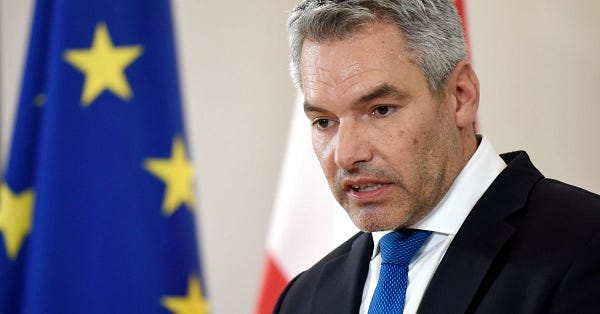Climate Goals
The coalition has been negotiating comprehensive climate change legislation for over a year but is no closer to introducing a bill to parliament

Servus!
Ours is an age of meteorological extremes. On Friday, the westernmost state of Vorarlberg was visited by biblical rainfall: 200 liters of water per square meter fell on the city of Bregenz alone, causing mudslides, flooding basements and underpasses, and shutting off part of the main railway line that runs like an artery through the Rhine valley. In 24 hours, the fire department was called out 1,300 times. The rain came as a relief to the mayor of Langen bei Bregenz, a village whose water sources had almost run dry in the preceding weeks.
This is just one example of an extreme weather or climatic event that has changed the face of the country this year. Record temperatures and long, dry spells have meant water levels at Lake Neusiedl, a popular recreation destination on the border between Austria and Hungary, have fallen to their lowest levels for 60 years. Extreme rainfall cut off the rail link between Vienna and the state of Carinthia on Friday, meaning passengers had to divert via Salzburg or simply stay home. Austria’s glaciers are on the retreat, including the Jamtal Glacier in the Tyrolian Silvretta Alps, which will soon be confined to history.
Europe’s rivers are running dry, and its summers are now marked by record temperatures, droughts, stunted or rotten crops, and deadly forest fires as a matter of course. The continent is burning, climate change organizations like Fridays for Future are screaming, and yet the Green Party cannot get its coalition partner, the conservative People’s Party (ÖVP), to agree to a comprehensive climate change bill.





Energy minister Leonere Gewessler has particular environmentally-minded achievements to her name, it’s true, including subsidized national rail travel and the ‘eco-social’ tax reform package whose Klimabonus payments designed to offset a tax on carbon are due to roll out for the first time this fall. But it remains a source of much frustration that, after more than a year of negotiations with her coalition partner, the government still has not produced a climate change package. The ÖVP, she told the radio station Ö1 in an interview Tuesday morning, simply isn’t interested in the issue. It takes two to tango, the Greens’ climate spokesperson Lukas Hammer told the station the day prior, and the ÖVP doesn’t want to get up on the dancefloor.
For their part, the ÖVP’s climate spokesperson Johannes Schmuckenschlager has said that the coalition has worked and is working on a raft of other climate-related measures including a new renewable energy expansion bill. As such, a single, comprehensive piece of climate change legislation simply isn’t a priority. For Hammer, a climate change bill that, among other things, anchors climate change goals in the constitution through legislation such that cities and states who don’t meet those goals can be held to account isn’t an option but rather a necessity. The climate is not a but rather the priority.
The Greens want Austria to be carbon-neutral by 2040, with legislation that sets even lower annual emissions targets to that end. The country’s net carbon output should be halved by 2030 in line with EU climate change targets. One way this might be achieved is through automatic tax increases on petrol and diesel, a measure the chambers of commerce and labor as well as the automobile lobby opposes. This would all be part of any climate change bill, and what the Greens fear most of all is that without constitutionally-anchored climate change goals as a part of it, any legislation they can get the ÖVP to agree to will end up being toothless.
Bis bald!
Thank you for being a subscriber to the Vienna Briefing. If you know someone else who might be interested in reading this newsletter, consider sharing it with them today.


The ÖVP is in the grip of an existential crisis, I wrote in an op-ed for Politico on Monday. The rocky period for the party is symptomatic is of a larger trend not only in Austria but Europe as a whole, namely that the era of the political party as a broad church is over.
The Vienna Briefing is a free newsletter. If you enjoy and would like to support my work, think about sending me a tip via PayPal.
The President Falls
President Alexander Van der Bellen has been released from hospital and is recuperating at home following a hiking accident that left the 78-year-old with abrasions and a mild concussion. Van der Bellen suffered the accident while hiking in the Ötztal Alps on Sunday.
The President’s Challenged
The musician Dominik Wlazny, better known by his alias Marco Pogo, has acquired enough signatures of endorsement to officially enter the presidential race. Tassilo Wallentin, an attorney and former columnist for the tabloid Krone, unveiled his candidacy last week and has already found the required 6,000 supporters to get his name on the ballot.
The President Gets Up
Even in an ever-expanding field of candidates, Van der Bellen is set to comfortably win re-election in October. A new poll published by the magazine Profil shows the incumbent would win 66 percent of the vote in the first round were an election held tomorrow. His closest challenger, Freedom Party (FPÖ) candidate Walter Rosenkranz, polled at 13 percent.


